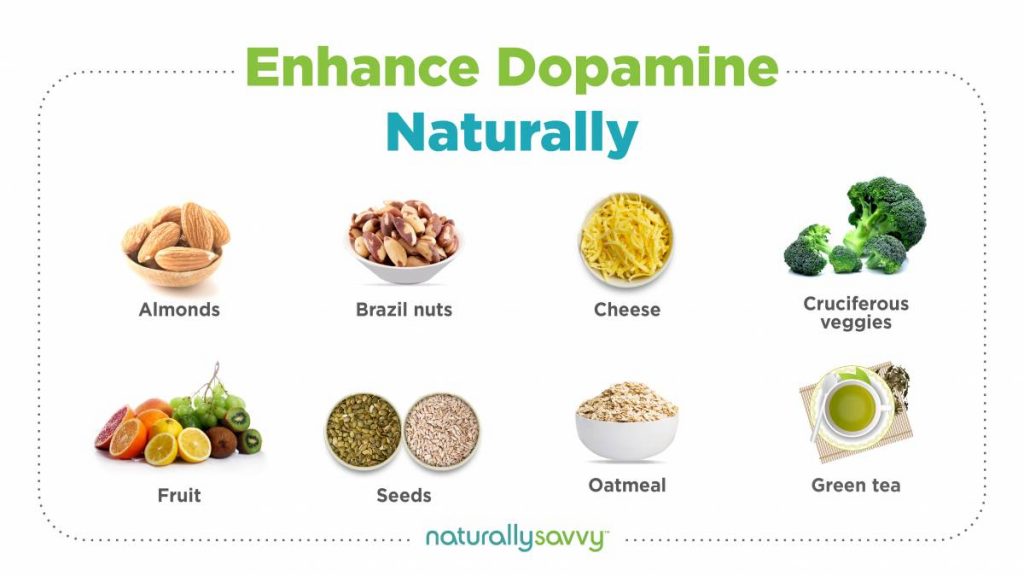
It’s time to get the scoop on dopamine, a substance in your brain that is also known as the motivation molecule. Your body is home to about 60 different molecules known as neurotransmitters that transfer information between your brain cells and your body. Dopamine caught our eye because, well, we were motivated!
What are neurotransmitters?
Dopamine is just one of the many neurotransmitters (aka transmitters) that impact and help regulate every cell, tissue, and organ in the body. Each neurotransmitter is important, and even more significant is maintaining a balance among your brain transmitters. When the neurotransmitters are in balance, you are better to think clearly, experience joy, and have a sense of well-being.
Read about the latest on gut-brain health
What is dopamine?
Were you motivated to read this article? It could be because of the dopamine in your brain! This neurotransmitter is credited with the ability to focus, experience pleasure, maintain attention span, follow-through, and feel satisfaction when learning something new, finishing a task, receiving praise, or playingplaying sports.
Although dopamine has a good side, like other things in life, too much of a good thing can be harmful. It’s important to have a dopamine system that’s in balance. If it is not, it can cause significant functional problems in your brain.
Signs of dopamine imbalance
Signs of an unbalanced dopamine system can include apathy, fatigue, forgetfulness, sugar cravings, sleep disturbances, moodiness, less motivation, poor motor control, and an inability to focus. Fortunately, there are healthy ways to help bring dopamine levels back into balance.
Read about 9 herbs that calm your nerves (and mind)
Natural nutrients to increase dopamine levels
Although it can be beneficial to boost dopamine levels, you can can also do detrimental things and cause dopamine overactivation, which increases the risk for addiction to things like nicotine, alcohol, sugar, caffeine, and other substances. Therefore, we encourage moderation when enjoying natural nutrients (and foods discussed below) to increase dopamine levels and bring them into balance.
- Raw cacao: Among the key ingredients the body needs to make dopamine is beta-phenlethylamine (PEA), and raw cacao, used in dark chocolate, is a good source. PEA crosses the blood-brain barrier and helps stimulate the release of this neurotransmitter. Dark chocolate (not milk chocolate) contains cocoa flavanols, which can help boost blood flow to the brain, boost mood, and improve the ability to think clearly. Chocolate contains salsolinol, which attaches to dopamine receptors and is believed to help enhance mood. This tasty treat also contains tryptophan, is converted to serotonin (another neurotransmitter) in the brain and helps with mood.
- Curcumin: Curcumin, which is a bioactive ingredient in turmeric, has powerful antioxidant and anti-inflammatory properties. Results of animal studies indicate that curcumin’s impact on mood may be associated with dopamine levels.
- Magnesium: Approximately half of Americans may be deficient in magnesium, which is essential for brain function, including neurotransmitters. Magnesium also is involved in regulating blood sugar, blood pressure, blood flow, and heart rhythm,, as well as promoting sleep, memory, immune function, and healthy aging.
- Vitamin D: Maintaining optimal vitamin D levels is essential for overall brain function and promoting the actions of dopamine in particular. Healthy levels of vitamin D are also necessary for a positive mood and general well-being. A simple blood test can reveal your vitamin D level and whether you need a supplement, which many people do.
- Fish oil: The two main omega-3 fatty acids found in fish oil—eicosapentaenoic acid (EPA) and docosahexaenoic acid (DHA)–are necessary for the functioning of all cells. In particular, DHA is critical for the brain’s messaging system to work properly, which means the actions of dopamine and other neurotransmitters depend on the brain having enough DHA available.

Foods to boost dopamine levels
Along with nutrients, there are some foods you can add to your diet that will raise dopamine levels. These foods are typically high in the amino acid tyrosine, which is what dopamine is made from, or they promote dopamine in other ways.
- Almonds: These nuts, as well as many others, contain high levels of tyrosine. Use them as snacks, a topping for salads and yogurt, or in casseroles.
- Brazil nuts: These nuts are extremely rich in selenium, which is necessary for dopamine production.
- Cheese: Dairy cheese can be added to so many foods and enjoyed as a snack on its own. Anyone who is lactose intolerant should skip this suggestion.
- Cruciferous veggies: Broccoli, cauliflower, kale, Brussel sprouts, and cabbage contain sulfur compounds that enhance glutathione levels, which are needed for optimal release of dopamine.
- Fruits: The fruits highest in tyrosine are starfruit, apricots, elderberries, cranberries, strawberries, kiwi, guava, avocado, and figs.
- Seeds: Although sesame seed flour is very high in tyrosine, the seeds that top the list are pumpkin, squash, and watermelon, unless you can get your hands on breadfruit seeds. Further down the list are sesame seeds, sunflower, and black walnuts.
- Oatmeal: A great source of tyrosine you can enjoy every day!
- Green tea: Green tea is helpful in Parkinson’s disease, which is characterized by a loss of dopaminergic brain cells. The use of green tea can help boost tyrosine and dopamine levels.
Bottom line
Healthy levels of dopamine are critical for various reasons: it is necessary for brain health, motivation, our ability to focus, think, make decisions, concentrate, and experience pleasure. It plays a role in sleep, heart rate, pain, kidney function, and movement. Certain foods and nutrients are important for maintaining a healthy dopamine balance.










